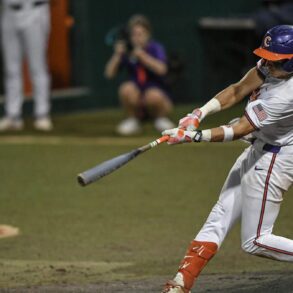As the first droplets of rain hit Skip Bertman Field, the crew at Alex Box Stadium rushed the field with a tarp. The fans rushed for cover as the jumbotron delivered the news: tonight’s LSU baseball game will be delayed due to lighting in the area.
Louisiana residents are no strangers to rain and crazy weather, but rain can be a baseball fan’s worst nightmare. Flooding with constant thunderstorms occurs just as quickly from April to August.
But do weather delays help the sport of baseball? Rain delays are one of the few things in sports that can completely change the flow of a game, sometimes for better, sometimes for worse.
On Tuesday night, the game at Alex Box against Northwestern State stopped after a crack of lightning hit the sky. Players returned to the dugout as the game went into a 30-minute delay.
Every strike of lighting within 8 miles of the stadium resets the 30-minute clock, making performing for these athletes much more unpredictable.
These interruptions can hurt teams like LSU, halting momentum and clearing out packed stadiums. But at times, a well-timed delay can serve as an unlikely reset button, giving teams time to regroup and change the course of a game.
The most notable example that helped the Tigers recently is the Mississippi State series, which started no earlier than 9 p.m. An original start time of 2 p.m. was pushed back by over seven hours due to inclement weather that didn’t seem to stop.
After the two games, which were on heavy delay, finally began, LSU was on the mark with the play on the field. Bats were working, and pitching just kept going. LSU walked away with a 17-8 win and a series sweep in the final game on Saturday, which ended at 1:42 a.m. the next day.
Another memorable example of rain benefiting a team came during LSU’s 2023 College World Series run. A storm delayed play in a matchup against Wake Forest and shifted pitching rotations.
The delay allowed LSU to rest its bullpen and rework its strategy, helping it ultimately come out on top in a 2-0 thriller. The pause also gave star pitcher Paul Skenes extra recovery time, setting him up for a dominant showing when play resumed.
Rain delays can also break up an opponent’s rhythm. A hot-hitting team might cool off mentally and physically during a delay, while a struggling squad can use the time to reset. LSU head coach Jay Johnson has spoken about using delays to talk through strategy, motivate players and turn a potential negative into a team-winning advantage.
Of course, not every delay plays in a team’s favor. A break in play can throw off a pitcher’s tempo, especially when locked into the task at hand. Batters can lose the feel for timing at the plate.
The crowd’s energy can fade after hours of waiting around, and fans begin to clear the stands to go home. LSU has also seen its share of challenges, like in 2022 against Southern Miss in the NCAA Regionals. After a long delay, LSU struggled to regain its early spark and fell short.
Rain delays have played pivotal roles across sports. Think back to Game 7 of the 2016 World Series between the Cubs and the Indians. A 17-minute rain delay before the 10th inning gave Chicago enough time to regroup and eventually win its first title in 108 years.
So, do rain delays help or hurt?
The answer depends on timing, momentum and mindset. For LSU baseball, they’ve been both a blessing and a challenge. But in the high-pressure world of college baseball, being able to adapt, whether it be a pitcher’s curveball or one good crack of lightning across the sky, separates contenders from champions.
This post was originally published on this site be sure to check out more of their content.











